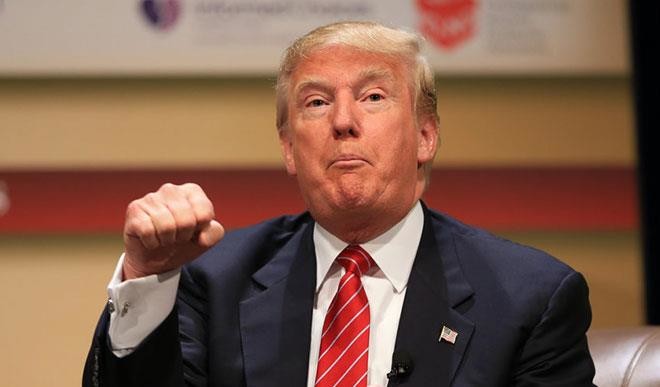
Just a little over 100 days into his presidency, American grammarians have concluded that President Donald Trump is already doing tremendous (Trump’s favorite word) violence to the English language. I hinted at this months ago.
In my November 13, 2016 article titled, “Mangled Trumpian Grammar as New American English?” I wrote: “Trump contorted the English language in more ways than any presidential candidate did. First, he was notorious for terrible, sometimes hilarious, misspellings on Twitter. After the Republican primary debates on February 26, 2016, for instance, Trump tweeted: ‘Wow, every poll said I won the debate last night. Great honer!’
“He had earlier tweeted the following: ‘Lying Ted Cruz and leightweight chocker Marco Rubio teamed up last night in a last ditch effort to stop our great movement. They failed!’ Trump became the object of ridicule. Senator Marco Rubio viciously excoriated him for his poor spelling the following day at a campaign rally. A headline in the website Mediaite.com captured it well. ‘Donald Trump Is Cluelessly and Hilariously Spelling Everything Wrong on Twitter Today,’ it said.
“Even the Merriam-Webster Dictionary couldn’t help pillorying Trump. It sent out a tweet where it defined ‘honer’ as ‘one that hones,’ and adds: ‘leightweight: We have no. idea.’ It also defined ‘chocker’ in obvious dig at Trump’s clumsy attempt to spell ‘choker.’ (By ‘honer,’ Trump meant to write ‘honor.’)
“But it’s Trump’s unusual turns of phrase and simplistic, repetitive vocabulary that have attracted the most attention from American grammarians. A famous study by Carnegie Mellon University concluded that he speaks at a Third Grade Level, that is, the level of an American Primary School kid.
“English teachers have also torn apart his grammar. For instance, he mistook ‘temper’ for ‘temperament’ during one of his debates with Hillary Clinton. He also uttered the nonstandard ‘you was’ during the debate. He said, ‘But you was totally out of control!’ instead of the standard ‘But you were totally out of control!’ Grammar pedants tore him to shreds.
“And when he said, ‘They talk good around election’ instead of ‘they speak well around election time,’ many English teachers took to social media to say he had lost their votes. It is impossible to chronicle all the Trumpian solecisms in this article, but others that stood out include, ‘I pay tremendous numbers of taxes’ and ‘Give economics to people.’
In a May 2, 2017 article titled, “Trump accelerating degradation of English language,” New York Times columnist Charles M. Blow says Trump is bad for the English language. Given the outsized influence of social and political elites in shaping usage norms, he is right. Read his article below:
One of the more pernicious and insidious effects of the Donald Trump regime may well be the damage he does to language itself.
Trumpian language is a thing unto itself: some manner of sophistry peppered with superlatives.
It is a way of speech that defies the Reed-Kellogg sentence diagram. It is a jumble of incomplete thoughts stitched together with arrogance and ignorance.
America is suffering under the tyranny of gibberish spouted by the lord of his faithful 46 percent.
As researchers at Carnegie Mellon pointed out last spring, presidential candidates in general use “words and grammar typical of students in grades 6-8, though Donald Trump tends to lag behind the others.”
Indeed, among the presidents in the university’s analysis, Trump’s vocabulary use was the lowest and his grammatical usage was only better than one president: George W. Bush.
Trump’s employment of reduced rhetoric is not without precedent and is in fact a well-documented tool of history’s strongmen.
As New York Times CEO Mark Thompson noted about one of Trump’s speeches in his 2016 book, “Enough Said: What’s Gone Wrong with the Language of Politics?”:
“The super-short sentences emphasize certainty and determination, build up layer upon layer, like bricks in a wall themselves, toward a conclusion and an emotional climax.
“It’s a style that students of rhetoric call parataxis. This is the way generals and dictators have always spoken to distinguish themselves from the caviling civilians they mean to sweep aside.”
Thompson also notes that “Trump’s appeal as a presidential candidate depends significantly on the belief that he is a truth-teller who will have nothing to do with the conventional language of politics,” warning that:
“We shouldn’t confuse anti-rhetorical ‘truth telling’ with actually telling the truth. One of the advantages of this positioning is that once listeners are convinced that you’re not trying to deceive them in the manner of a regular politician, they may switch off the critical faculties they usually apply to political speech and forgive you any amount of exaggeration, contradiction, or offensiveness.
And if establishment rivals or the media criticize you, your supporters may dismiss that as spin.”
Here is the great danger: Many people expect a political lie to sound slick, to be delivered by intellectual elites spouting $5 words.
A clumsy, folksy lie delivered by a shyster using broken English reads as truth.
It is an upside-down world in which easy lies sound more true than hard facts.
But this is what comes from a man who is more watcher than reader, a man more driven by the limelight than by literature.
In January, Vanity Fair attempted to answer the question: “Exactly How Much TV Does Donald Trump Watch in a Day?” They did so by producing this utterly frightening roundup:
“Early on in the campaign, Trump told Chuck Todd on “Meet the Press” that he gets military advice from TV pundits.
“He couldn’t get through a 50-minute Washington Post interview without repeatedly looking at the TV and commenting about what was on it.
“In November, during the transition, The Post noted that, based on his biography, ‘He watches enormous amounts of television all through the night.’
“And just this week, a source told Politico that Trump’s aides are being forced to try and curb some of his ‘worst impulses’ – including TV-watching, apparently: ‘He gets bored and likes to watch TV … so it is important to minimize that.’”
A piece in The New York Times in the first week of Trump’s presidency noted: “Still, Mr. Trump, who does not read books, is able to end his evenings with plenty of television.”
Trump has the intellectual depth of a coat of paint.
At no time is this more devastatingly obvious than when he grants interviews to print reporters, when he is not protected by the comfort of a script and is not animated by the dazzling glare of television lights.
In these moments, all he has is language, and his absolute ineptitude and possibly even lack of comprehension is enormously obvious.
In the past month, Trump has given interviews to print reporters at The Times, The Associated Press, Reuters and The Wall Street Journal.
Read together, the transcripts paint a terrifying portrait of a man who is simultaneously unintelligible in his delivery, self-assured in his ignorance and consciously bathing in his narcissism.
In Trump world, facts don’t matter, truth doesn’t matter, language doesn’t matter. Passionate performance is the only ideal.
A lie forcefully told and often repeated is better than truth – it is accepted as an act of faith, which is better than a point of fact.
This is one of the most heinous acts of this man: the mugging of the meaning, the disassembling of rhetoric until certainty is stripped away from truth like flesh from a carcass.
Degradation of the language is one of Trump’s most grievous sins.
Charles M. Blow is a columnist for The New York Times.

 Join Daily Trust WhatsApp Community For Quick Access To News and Happenings Around You.
Join Daily Trust WhatsApp Community For Quick Access To News and Happenings Around You.


